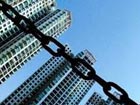| Videos | ? Latest |
|
? Feature | ? Sports | ? Your Videos |
Housing market in Beijing cooling down

It's been almost two months since several restrictive measures for property buying were implemented by the Chinese central government. As a result, the housing market in Beijing has been cooling down gradually.
Ever since the restrictive package on property purchasing was put into effect in late January, many preferential policies have been carried out by real estate agents in Beijing. All sorts of discounts are being offered in a bid to boost sales.
And so far, the deals are proving enticing.
One sales staff said "In less than two months, we have sold more than 100 houses. The discount is very large, and attracts lots of attention.That boosts sales - more than we expected."
But the good results, thanks to the preferential policy, are just part of the story. Statistics released in February show a 60 percent drop in the amount of new houses sold in Beijing, month on month. Compared with new houses, second-hand homes are doing no better.
With prices going down gradually, most second-hand homeowners are giving up on their plans to sell. And with rents rising, they're turning to the rental market, stagnating second-hand house sales, which could potentially lead to recession.
Hu Jinghui, Vice President of www.5i5j.com said "In terms of trading volume, in the month before the restrictive package, more than 1000 units were traded, but in the month after that, there were no more than 500. That was a decline of about 60 percent."
Earlier this year, the restrictions tried to dampen property speculation by imposing more requirements on house buyers. With the number of buyers in decline, property investors may choose to sell due to the pressures of possible house devaluation or real estate tax.
With potential house buyers expecting more decline, all this presents a comparatively blurred and complicated picture. Experts say it will take two or three months before a better idea of the property market can be drawn up.
 0
0 






